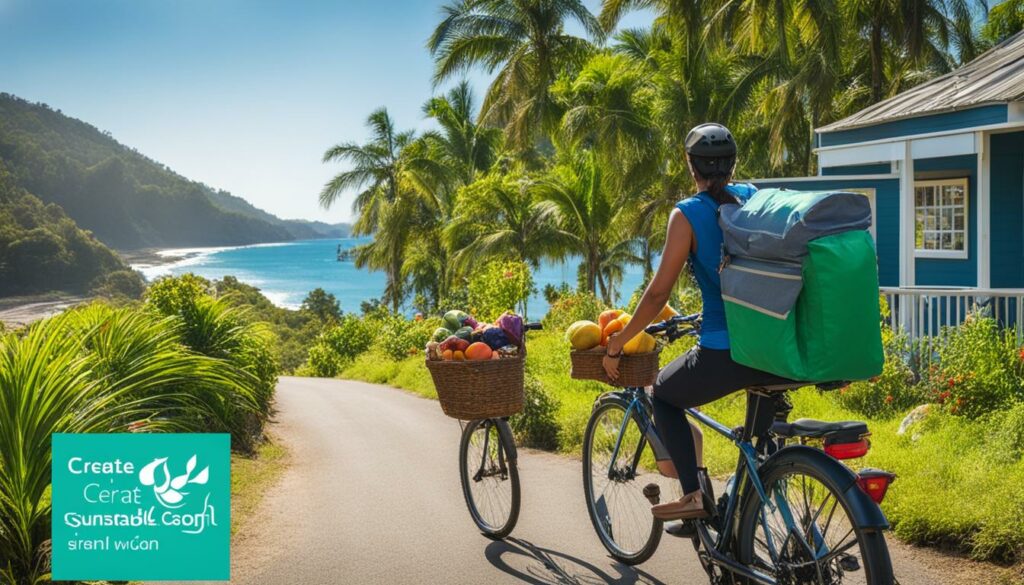Welcome to the Sunshine Coast, where eco-friendly living is not just a trend, but a way of life. By adopting sustainable living practices, you can contribute to a greener, healthier, and more resilient community. Whether you are an individual, a household, or a business, there are plenty of green living tips and resources available to help you make a positive impact on our environment.
From reducing natural resource consumption to embracing renewable energy sources, there are various ways you can play a part in creating a sustainable future for the Sunshine Coast. The Sunshine Coast Council is committed to promoting and supporting these practices, working hand in hand with residents and businesses to make a difference.
Key Takeaways:
- Embracing sustainable living practices contributes to a greener and more resilient Sunshine Coast.
- The Sunshine Coast Council provides education and resources to promote sustainable living.
- Reducing energy consumption and embracing renewable energy sources can have a significant impact.
- Supporting organic farming and reducing food waste are essential for sustainable agriculture.
- Making eco-conscious consumer choices can help reduce waste and promote a circular economy.
How to Travel and Move Around Sustainably
Embracing sustainable living practices extends beyond our daily habits and choices. It also includes making better choices about how we travel and move around. By opting for eco-friendly transportation options, we can reduce our carbon footprint and contribute to a greener future for the Sunshine Coast.
One of the simplest ways to travel sustainably is by utilizing public transportation. The Sunshine Coast offers a well-connected network of buses and trains, making it convenient to get around without relying on private vehicles. Not only does this help reduce traffic congestion, but it also decreases greenhouse gas emissions, improving air quality in our communities.
Walking and cycling are other great alternatives to consider. These modes of transport not only promote environmentally friendly commuting but also contribute to a healthier and more active lifestyle. The Sunshine Coast boasts beautiful landscapes and scenic paths, making walking and cycling enjoyable and rewarding experiences. By embracing these sustainable travel options, we can reduce our environmental impact while staying fit and connected with our surroundings.
“Choosing sustainable travel options helps reduce our carbon footprint and create a greener future for the Sunshine Coast.”
Remember, every small step towards sustainable travel counts. Whether it’s opting for public transportation, walking, or cycling, each choice we make has a positive impact on our environment. Let’s embrace these eco-friendly transportation options and collectively contribute to a more sustainable and vibrant Sunshine Coast.
Benefits of Sustainable Travel
Sustainable travel offers numerous benefits, not only for the environment but also for our communities and personal well-being. Here are some key advantages:
- Reduces greenhouse gas emissions and air pollution
- Decreases traffic congestion
- Promotes a healthier and more active lifestyle
- Enhances community connectivity and social interactions
- Saves money on fuel and parking expenses
By choosing sustainable travel options, we can contribute to a cleaner, healthier, and more sustainable Sunshine Coast. Start making a difference today!
| Sustainable Travel Options | Advantages |
|---|---|
| Public Transportation | – Reduces traffic congestion – Lowers carbon emissions – Cost-effective |
| Walking | – Promotes physical activity – Improves mental well-being – Zero carbon emissions |
| Cycling | – Environmentally friendly – Quick and efficient – Health benefits |
Reduce Your Energy Consumption and Embrace Renewable Energy
Sustainable living practices include reducing energy consumption and embracing renewable energy sources. By making conscious choices about how we use energy, we can minimize our impact on the environment and contribute to a greener future. The Sunshine Coast, with its abundant sunlight, is an ideal location for harnessing solar power, a renewable energy source that offers numerous benefits.
One of the key ways to reduce energy consumption is by using energy-efficient appliances and making small changes in our daily habits. Switching to LED light bulbs, insulating our homes, and ensuring that electronics are turned off when not in use are simple yet effective ways to decrease energy usage. These practices not only help to reduce our carbon footprint but also result in long-term cost savings on electricity bills.
Benefits of Embracing Solar Power
“Solar power is a clean and renewable energy source that offers numerous benefits. By installing solar panels on your property, you can generate your own electricity and reduce reliance on traditional energy sources. Solar power not only lowers your energy bills but also helps to reduce greenhouse gas emissions, combat climate change, and create a more sustainable future.”
The Sunshine Coast Council actively supports the adoption of renewable energy and provides resources to help residents make the transition to solar power. In addition to financial incentives and educational programs, the council also works to improve the infrastructure for solar energy generation.
| Benefits of Solar Power | Benefits of Energy Efficiency |
|---|---|
| Reduces greenhouse gas emissions | Lowers energy bills |
| Creates a more sustainable future | Minimizes environmental impact |
| Decreases reliance on traditional energy sources | Helps to combat climate change |
| Long-term cost savings | Improves energy security |
By reducing energy consumption and embracing renewable energy sources like solar power, you can play a significant role in building a sustainable future for the Sunshine Coast. The combination of energy-efficient practices and renewable energy can lead to a cleaner environment, lower energy bills, and a more resilient community.
Embrace Organic Farming and Reduce Food Waste
Sustainable living practices extend to our food choices as well. By embracing organic farming methods and reducing food waste, we can contribute to a more sustainable and environmentally friendly lifestyle. Organic farming promotes the use of natural fertilizers and pest control methods, avoiding the harmful chemicals found in conventional agriculture. Supporting local produce also reduces the carbon footprint associated with long-distance transportation and supports local farmers and communities.
One way to reduce food waste is through composting. Composting turns food scraps and other organic waste into nutrient-rich soil that can be used to fertilize gardens and plants. It not only reduces the amount of waste that goes to landfills but also helps to enrich the soil and reduce the need for synthetic fertilizers. Composting is a simple and effective way to minimize our ecological footprint and contribute to a more sustainable food system.
In order to further reduce food waste, it’s important to be mindful of our consumption habits. Planning meals ahead, buying only what is needed, and properly storing leftovers can all help to minimize food waste. By being conscious of our choices and making efforts to reduce waste, we can make a positive impact on the environment and create a more sustainable food culture.
Table: Benefits of Embracing Organic Farming and Reducing Food Waste
| Benefits of Organic Farming | Benefits of Reducing Food Waste |
|---|---|
| Eliminates the use of harmful pesticides and chemicals | Reduces the amount of waste that goes to landfills |
| Supports local farmers and communities | Enriches soil and reduces the need for synthetic fertilizers |
| Reduces the carbon footprint associated with long-distance transportation | Minimizes the ecological footprint |
Embracing organic farming methods and reducing food waste are essential steps towards a more sustainable and ecologically responsible lifestyle. By supporting local farmers, composting, and being mindful of our consumption habits, we can contribute to a healthier environment and create a more sustainable food system for future generations.
Make Eco-Conscious Consumer Choices
When it comes to sustainable living practices, making eco-conscious consumer choices is essential. By opting for sustainable products, recycling, and embracing secondhand shopping, you can significantly reduce your ecological footprint and contribute to a greener future.
Choosing sustainable products means supporting businesses that prioritize sustainability and ethical practices. Look for certifications like Fairtrade and organic labels when shopping for groceries or clothing. These products are produced with minimal impact on the environment and often support local communities and fair wages.
Another way to reduce waste and promote a circular economy is through recycling. Make sure to properly separate recyclables from your household waste and utilize recycling programs available in your area. This helps conserve resources and reduces the amount of waste sent to landfills.
“The greatest threat to our planet is the belief that someone else will save it.” – Robert Swan
Embracing secondhand shopping is not only a sustainable choice but can also be a fun and budget-friendly way to find unique items. Thrift stores, online marketplaces, and swap events provide opportunities to give pre-loved items a second life. By opting for secondhand, you prevent unnecessary production and waste while giving new homes to gently used items.
Benefits of Eco-Conscious Consumer Choices
By adopting eco-conscious consumer choices, you contribute to the preservation of natural resources, reduction of waste, and support for sustainable practices. Here are some key benefits:
- Reduced environmental impact: Sustainable products are produced with consideration for their environmental impact, reducing pollution, and minimizing the depletion of natural resources.
- Waste reduction: Recycling helps divert materials from landfills, reducing the strain on the environment and conserving resources.
- Support for sustainable businesses: By choosing sustainable products, you support businesses that prioritize ethical practices, fair wages, and environmentally friendly production methods.
- Cost savings: Secondhand shopping often offers affordable options, allowing you to save money while still finding high-quality items.
- Unique finds: Embracing secondhand shopping allows you to discover one-of-a-kind items that reflect your personal style and contribute to a more sustainable fashion industry.
Make a Difference with Your Choices
Every eco-conscious consumer choice you make has a positive impact on the environment and contributes to a more sustainable future. By supporting sustainable businesses, recycling, and embracing secondhand shopping, you become an agent of change.
Remember, small changes in your daily habits can have significant long-term effects. Together, we can create a more sustainable world for generations to come.
Conclusion
Embracing sustainable living practices in the Sunshine Coast is a surefire way to enhance your lifestyle while protecting the environment and saving money. By making conscious choices about how you travel, consume energy, source your food, and make purchases, you can play a pivotal role in creating a greener and more resilient community.
The Sunshine Coast Council is dedicated to promoting and supporting sustainable living initiatives, aiming to increase community understanding and adoption of eco-friendly lifestyle practices. With their education and collaboration efforts, the council ensures that the Sunshine Coast is at the forefront of sustainable living.
By working together, we can transform the Sunshine Coast into a haven of green living and sustainability. So, let’s continue to embrace sustainable living practices, make eco-conscious consumer choices, and contribute to a healthier and more prosperous Sunshine Coast for all. Start your journey towards a sustainable future today!
FAQ
What is sustainable living?
Sustainable living is about reducing our impact on the environment, improving wellbeing, and building community resilience through practices that conserve natural resources and reduce waste.
How can I travel and move around sustainably?
You can choose to use public transportation, walk, or cycle instead of driving a car. These options help reduce greenhouse gas emissions and improve air quality.
What can I do to reduce my energy consumption?
You can reduce your energy usage by using energy-efficient appliances, insulating your home, and turning off lights when not in use. Embracing renewable energy sources like solar power can further decrease your environmental impact.
How can I embrace organic farming and reduce food waste?
You can support organic farming methods and choose local produce, which promotes sustainable agriculture and reduces the use of harmful pesticides. Additionally, reducing food waste through practices like composting can minimize your ecological footprint.
What can I do to make eco-conscious consumer choices?
You can opt for sustainable products, recycle, and embrace secondhand shopping. Supporting businesses that prioritize sustainability and reducing consumption of single-use items contributes to reducing waste and promoting a circular economy.
Our sponsor is a really good resource for garage door repair service
Visit this link for more information https://rapidfixgaragedoors.com.au/brisbane/dakabin/










